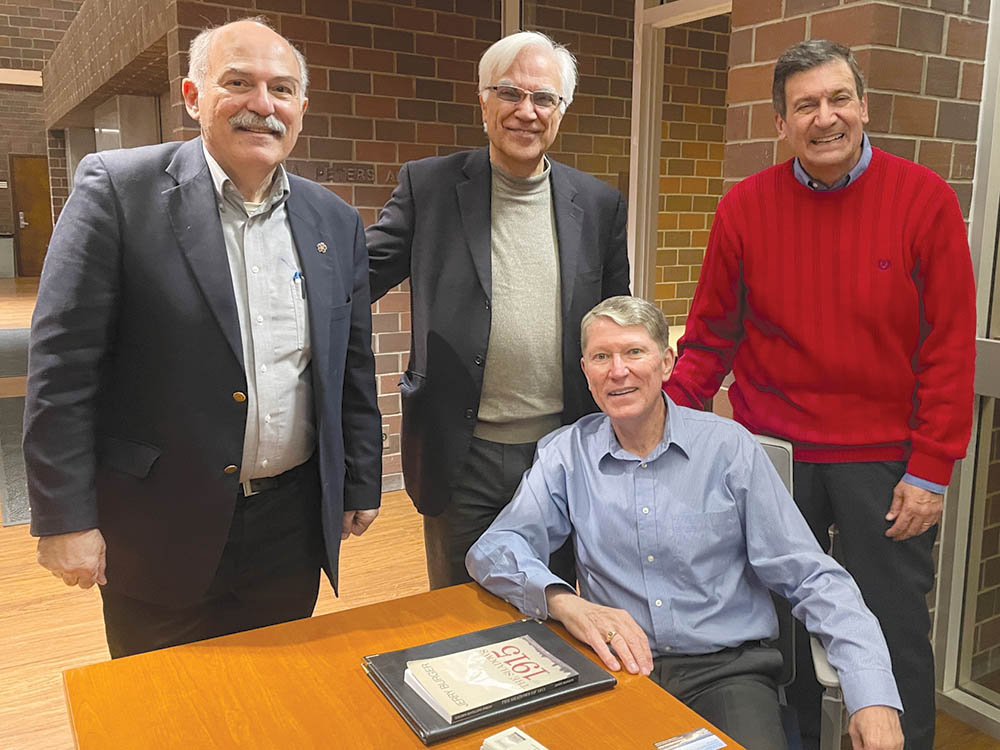
Photo: Andrew Hagopian
Christopher Petrosian
Staff Writer
“How do survivors and their families retain a belief in justice when atrocities go unpunished?” asks Dr. Jerry Burger, an expert in social psychology, in his book The Shadows of 1915.
Dr. Burger along with his colleague and friend Dr. Robert Vartabedian, were guest speakers for the Armenian Studies Program Spring Lecture Series on Friday, February 17, 2023. Professor Barlow Der Mugrdechian of the Armenian Studies Program introduced Dr. Vartabedian, former President of Missouri Western State University, who, together with Dr. Burger, had a discussion about The Shadows of 1915.
The moment was a reunion for the two lifelong friends, as they reminisced about their time at Fresno State in the 1970s. After Fresno State, each would go on to become successful in their individual fields.
Dr. Vartabedian discussed Dr. Burger’s nationally acclaimed work in the field of psychology, as well as his success in fiction writing. He then highlighted Dr. Burger’s expertise in the field of “psychological processes of inhumane acts” and how this contributes to the effectiveness of his work.
The presentation consisted of reading excerpts of the books and a discussion between Dr. Vartabedian and Dr. Burger. Dr. Vartabedian connected reading the section of the Armenian Genocide in the book to the experience of discussing the genocide with family.
Dr. Vartabedian then began asking Dr. Burger questions to discuss the inspiration behind the book and the greater questions posed by it.
Dr. Burger’s extensive work in research and teaching in social psychology and his experiences with the Fresno Armenian community created an opportunity to explore the Armenian Genocide in literature. The Shadows of 1915 is grounded in Fresno during the 1950s and explores an Armenian family’s internal struggles in dealing with the aftermath of a Genocide that occurred generations ago.
Dr. Burger read a scene exploring a woman’s account of surviving the Genocide which he noted was “based on real first-hand accounts of survivors.” Throughout the reading, human sentiments and nature were emphasized, as Dr. Burger also reflected on the inherent emotion and meaning of his book.
Dr. Burger explained that as the title suggests, the story is almost entirely based on the Armenian Genocide, with the story itself taking place in the “shadow of the genocide.” Dr. Burger discussed the lack of recognition of the Genocide and added that he was shocked by the fact that “people who are very well-read, people who are very educated … come up to me and say I had no idea.” He lamented this realization and added that he hoped his book would help rectify this fact. He added that this was one reason for his inclusion of the scene from 1915 and that he wanted he book to portray a definitive stance on what had happened.
When asked “What led you to write the book in the first place?,” Dr. Burger replied by mentioning his upbringing in Fresno and continuous exposure to the Armenian community. From this, he learned a lot about the history of the Genocide and different perspectives. “Every Armenian family had a story, a sad story, from the Genocide,” observed Dr. Burger.
“It’s very much alive in these families. There is very intense emotion surrounding Turkey and the Turks.” He then discussed how his book tackles the nuanced issue of reconciliation after the Genocide.
Dr. Burger described how the main character in the book, an Armenian man, and his non-Armenian fiancé, have a conversation that explores the matter. “Hatred is not an answer but neither is forgetting,” says the main character, a quote that Burger feels many Armenians can relate to.
Dr. Burger mentioned that his goal was not to write a book about Genocide, but to explore its aftermath. This is why The Shadows of 1915 mostly unfolds in the year 1953.
The discussion then led into the research necessary for such a project. Dr. Burger noted how his goal was to include real location names as much as possible to capture a view of the community appropriately. His interviews with the Fresno Armenian community also helped him in writing the book.
One source Dr. Burger highlighted was the book The Fresno Armenians by Berge Bulbulian. He recounted his time interviewing the late author. Overall, this discussion touched on many interesting topics such as reconciliation after Genocide, perceptions of justice, and other works that cover the Genocide.
 Hye Sharzhoom Armenian Action
Hye Sharzhoom Armenian Action